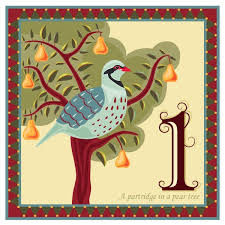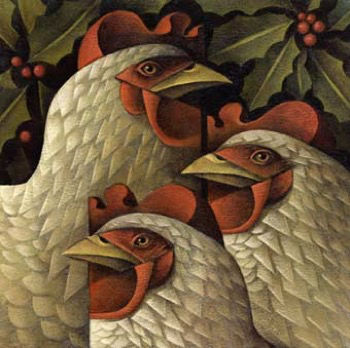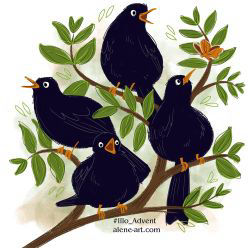
1st Day of Christmas
Christmas Day - celebrating the Birth of Jesus
It wasn’t until three centuries after the birth of Jesus that early church leaders in Rome decided to celebrate his birth on December 25. The first official mention comes from a Roman calendar in AD 336.
This was the first day of feasting after 4 weeks of abstinence during Advent (No meat or dairy for the whole of Advent.)
And since we will all be feasting todays carol is:
The Boars Head – Maddy Prior and the Carnival Band (with lyrics)
Of the several versions of the carol, the one most usually performed today is based on a version published in 1521 in Wynkyn de Worde's Christmasse Carolles

2nd Day of Christmas
St Stephen’s Day.
St Stephen was the first Christian martyr and was known for his service to the poor and was stoned to death in AD 36. It's also the day when the Christmas Carol 'Good King Wenceslas' takes place.
Carol: Good King Wenceslas - Horrible Histories
(OK, if you must...Good King Wenceslas - Loreena Mckennitt )
This carol is based on the life of Wenceslas, Duke of Bohemia, who became a martyr after being killed by his wicked brother, Boleslaw the Bad. Wenceslas’s body lies in St Vitus’s Cathedral, Prague, and he was recently made a patron saint of the Czech Republic.

3rd Day of Christmas
Feast of St John the Evangelist.
Christian tradition says that John the Evangelist was John the Apostle, one of the "pillars" of the Jerusalem church after Jesus' death. He was one of the original twelve apostles and is thought to be the only one to have lived into old age and not be killed for his faith. It had been believed that he was exiled (around 95 AD) to the Aegean island of Patmos, where he wrote the Book of Revelation.
Todays carol: The Sans Day Carol – Maddy Prior and the Carnival Band
One of the many Cornish Christmas carols recorded in the 19th century. A medieval chapelry dedicated to the Holy Trinity in the Parish of Gwennac near Penzance in Cornwall stood in the village of St. Day, named after a Breton saint, and was a major stop on the medieval pilgrimage route between Canterbury and St. Michael's Mount. It was here in the early 1900s that W. D. Watson, the Borough of Penzance's Head Gardener, collected the carol from a man of around firty or sixty years, named Thomas Beard. A wax cylinder recording exists in Sheffield University Library of Mr. Watson singing it himself.

4th Day of Christmas
The Feast of the Holy Innocents.
This day is also known as ‘Childermas’ or ‘Innocents Day’. It commemorates the date when King Herod ordered the massacre of the children under two years of age in Bethlehem in an attempt to kill the baby Jesus. Some traditional claims involve as many as 6,000 or 14,000 or even 144,000 deaths, though based on the population of male children in Bethlehem at that time, a few dozen is more likely.
(note, in the original ‘12 days’ carol it wasn’t ‘calling birds’ but ‘colly birds’, ‘colly’ being an old word for black, ie blackbirds.)
Todays carol: The Coventry Carol – Maddy Prior and the Carnival Band
The "Coventry Carol" dates from the 16th century and was performed in Coventry as part of a mystery play called ‘The Pageant of the Shearmen and Tailors’. The play depicts the Christmas story from chapter two in the Gospel of Matthew and refers to the Massacre of the Innocents. The lyrics of this haunting carol represent a mother's lament for her doomed child. The author is unknown but the oldest known text was written down by Robert Croo in 1534. The carol is traditionally sung a cappella.







